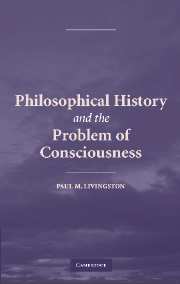Book contents
- Frontmatter
- Contents
- Preface
- Acknowledgments
- 1 Introduction: Philosophical History and the Problem of Consciousness
- 2 Structuralism and Content in the Protocol Sentence Debate
- 3 Husserl and Schlick on the Logical Form of Experience
- 4 Ryle on Sensation and the Origin of the Identity Theory
- 5 Functionalism and Logical Analysis
- 6 Consciousness, Language, and the Opening of Philosophical Critique
- Notes
- Works Cited
- Index
3 - Husserl and Schlick on the Logical Form of Experience
Published online by Cambridge University Press: 16 July 2009
- Frontmatter
- Contents
- Preface
- Acknowledgments
- 1 Introduction: Philosophical History and the Problem of Consciousness
- 2 Structuralism and Content in the Protocol Sentence Debate
- 3 Husserl and Schlick on the Logical Form of Experience
- 4 Ryle on Sensation and the Origin of the Identity Theory
- 5 Functionalism and Logical Analysis
- 6 Consciousness, Language, and the Opening of Philosophical Critique
- Notes
- Works Cited
- Index
Summary
In the last chapter, we saw how the structuralist picture of meaning that the philosophers of the Vienna Circle formulated led to deep and decisive problems with the explanation of experience. The structuralist conception of meaning arose in the attempt to accommodate experience within a general theory of meaning derived from the practice of logical analysis in the special context of epistemological reconstruction. Even when this epistemological project was abandoned, I argued, the underlying opposition of structuralist explanation to the content of experience has remained characteristic of analytic philosophy of mind, and has culminated in the contemporary problem of explaining consciousness. But because this theoretical configuration has remained in place largely owing to methodological continuities in the elucidatory and explanatory practices characteristic of the analytic tradition, understanding its role in generating the contemporary problem requires an understanding of the philosophical warrant and extent of the methods that have led to it.
Since the 1930s, the legacy of the philosophical investigation into experience has been one of stylistic discord and disunity between the analytic tradition and the phenomenological tradition founded by Edmund Husserl. Particularly with respect to the elucidation of the nature of experience, though, the phenomenological tradition has long purported to offer a genuine alternative to both the linguistic methods of analytic philosophy and the observational methods of empirical science.
- Type
- Chapter
- Information
- Philosophical History and the Problem of Consciousness , pp. 77 - 110Publisher: Cambridge University PressPrint publication year: 2004
- 1
- Cited by



